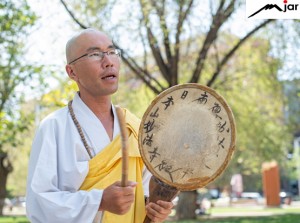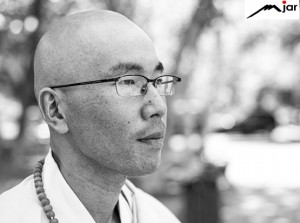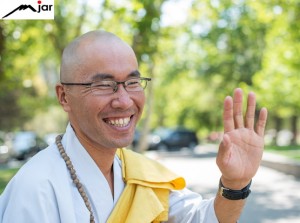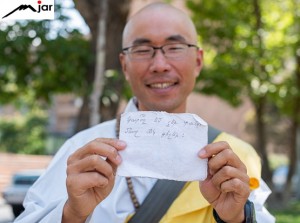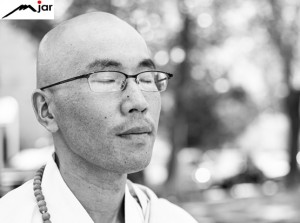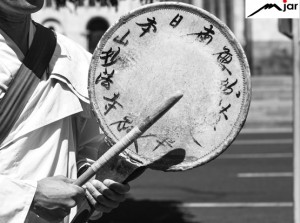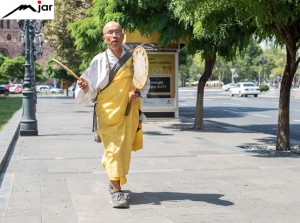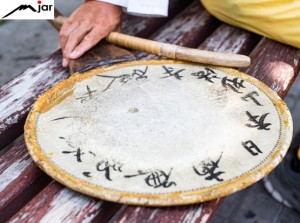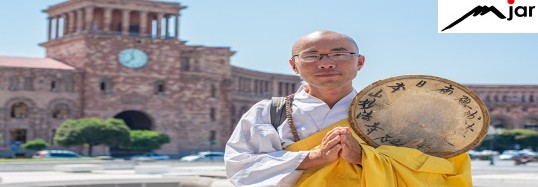
日本人僧侶の平和の信仰とアルメニア
Many people in Yerevan and in other towns of Armenia as well, already recognize the Japanese monk with his very distinctive appearance. For years the Buddhist monk Qanshin Ikeda travels in different countries of the world to announce the sound of peace.
He told Mediamax about his covenant, travelling and the days spent in Armenia.
The Decision of Becoming a Monk
Qanshin Ikeda travels in different towns of Armenia mainly on foot. In his hands he always carries a musical instrument, which is like drums. By means of hitting it, he makes a Buddhist mantra for the sake of making peace in the world.
Qanshin Ikeda
Photo by Mediamax
The passers-by, who already recognize him, greet in Armenian and try to speak to him. Though Ikeda doesn’t understand them, as an answer to everyone, he always says “shnorhakalutyun” for several times, that is “thank you”. It would be quite complicated to count how many times a day he utters this word. He has learnt the Armenian word “shnorhakalutyun”, which often seems long to articulate even for us Armenians.
Ikeda was born and brought up in Japan. He tells that though there weren’t any monks in his family, his grandmother and mother often went to a monastery.
“When I was 10 year’s old, my grandmother took me to a Buddhist monastery for the first time and I felt deep connection with Buddha. After graduation I was working in a company in the sphere of industry. During those years I bought a book from a bookstore on Buddhism and started to study the doctrine on my own. Two years past, when I was 28, during one of my visits to the monastery I made a distinct decision to become a monk”, tells Ikeda.
Travelling with the Sounds of Peace
After practicing the doctrine for years in Tokyo, since 2017 Ikeda decides to travel to different countries in order to say his prayers in different corners of the world.
Qanshin Ikeda
Photo by Mediamax
He has been to the USA, Great Britain, Austria, Italy, France and a number of African countries. Sometimes he has walked together with his fellow brothers from his doctrine and sometimes he has walked alone. He has participated in different spiritual ceremonies, as well as in the construction of peace stupas in different countries.
In 2019 after being in Nepal he visited India, where he joined Jal Jagat annual world peace march from India to Switzerland.
Because of coronavirus many of the pilgrims returned to their countries meanwhile Ikeda and some of his friends continue their mission.
Overnight in the Open Air
Being in Armenia since March he has managed to be in Gyumri, Spitak, Ijevan, Sevan and in a number of towns. He mainly goes for a walk but kind people often take him certain way by car.
Qanshin Ikeda
Photo by Mediamax
“In Noravank I met a kind woman, who wrote on a piece of paper the following words in Armenian: “Can I stay at your house for a night?” I show this paper to the locals and often people are very kind to me. They invite me in, let me have a shower and stay in their house for a night”, says the monk.
Qanshin Ikeda
Photo by Mediamax
Ikeda says that he often sleeps in the caves or just in the open air in a sleeping bag. Sometimes on his way he comes across abandoned houses, which become a shelter for him.
“The Armenians are very hospitable and kind to me. Sometimes my bag gets too heavy from the food donation as people always treat me with vegetables, lavash and other products; they often give me money as well. I really appreciate it and I am deeply grateful for that”, says he.
“Mantra is like a medicine”
The musical instrument which always accompanies the monk is made in Japan. In the future the monks write their prayers on it.
Qanshin Ikeda
Photo by Mediamax
On Ikeda’s instrument there is written the mantra Na Mu Myo Ho Ren Ge Kyo, which is a promise not to give in to difficulties and overcome sufferings. It is also a covenant to help others, discover this principle and achieve happiness.
“It is not possible to explain the essence of mantra because it is totally spiritual. It’s like a medicine. You believe the physician, take the medicine prescribed by him and you get well. It’s the same with mantra. The mantra, which is uttered with deep faith cures and relieves the suffering”, says Ikeda.
From War to Free Civilization
Ikeda says though he himself hasn’t gone through a war, he is well aware of the history and knows the sufferings caused by the war. He is also informed of the Armenian Genocide and the Karabakh conflict, for which he attaches great importance to saying prayers in Armenia.
Qanshin Ikeda
Photo by Mediamax
“In the result of the earthquake, which took place in Japan in 2011, Fukushima nuclear power plant was damaged, which did much harm to the people and nature. Having this tragedy before my eyes I wanted to visit Metsamor at the end of July, where there is also a nuclear power plant. A policeman stopped me on my way and took to the police station, where I was interrogated for a long time. When I came out of the police station it was rather late and I didn’t know where to stay for the night. A kind woman police officer donated food and money to me. She also introduced me to a social worker woman who provided me with shelter and food. I highly appreciate their kindness”, says Ikeda adding that even from the distance of 2 kilometers he however managed to complete his prayer for Metsamor nuclear power plant.
Qanshin Ikeda
Photo by Mediamax
The Japanese monk also highlights the importance of spreading the message of his spiritual teacher Nichidatu Fuji, which is the following: “Civilization doesn’t mean to have electricity, planes or atomic bombs. Civilization means not to kill, not to destroy, not to provoke wars. Civilization means to maintain mutual warmth and to respect each other”.
“Peace will come if we all…”
“We are all the same human beings irrespective of the country we come from, what belief we have. We are all brothers and we should have deep respect towards each other. If we love and respect each other, sincerely pray and believe, peace will come. I believe in it”, says Ikeda.
Qanshin Ikeda
Photo by Mediamax
As soon as the borders are open, the Japanese monk will leave Armenia to continue his mission in other countries. In November he should return to Japan in order to participate in two large Buddhist ceremonies.
“I want to express thanks to the inhabitants of Armenia. I appreciate their kindness and hope to come to Armenia again in the future”, ends the conversation Kanshin Ikeda.
the material is taken from https://mediamax.am
translated from Armenian into English by M.Vardanyan
小島健一によって、題名のアルメニア語から日本語に翻訳しました


